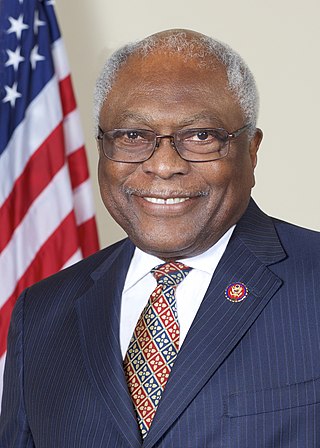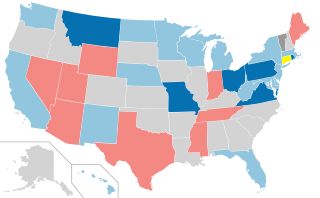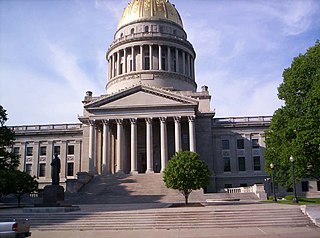
Lincoln Davenport Chafee is an American politician. He was mayor of Warwick, Rhode Island, from 1993 to 1999, a United States Senator from 1999 to 2007, and the 74th Governor of Rhode Island from 2011 to 2015. He was a Democrat from 2013 to 2019; in June 2019, The Boston Globe reported that he became a Libertarian, having previously been a Republican until September 2007 and an independent and then a Democrat in the interim. He is the last non-Democrat to hold statewide and/or Congressional office in Rhode Island.

The 2004 United States Senate elections were held on November 2, 2004, with all Class 3 Senate seats being contested. They coincided with the re-election of George W. Bush as president and the United States House elections, as well as many state and local elections. Senators who were elected in 1998, known as Senate Class 3, were seeking re-election or retiring in 2004.

James Enos Clyburn is an American politician serving as the U.S. representative for South Carolina's 6th congressional district. First elected in 1992, Clyburn represents a congressional district that includes most of the majority-black precincts in and around Columbia and Charleston, as well as most of the majority-black areas outside Beaufort and nearly all of South Carolina's share of the Black Belt. Since Joe Cunningham's departure in 2021, Clyburn has been the only Democrat in South Carolina's congressional delegation.
The Democratic Senatorial Campaign Committee (DSCC) is the Democratic Hill committee for the United States Senate. Its purpose is to elect Democrats to the United States Senate. The DSCC's current Chair is Senator Gary Peters of Michigan, who succeeded Nevada's Catherine Cortez Masto after the 2020 Senate elections. DSCC's current executive director is Christie Roberts.

The 2006 United States Senate elections were held on November 7, 2006, with all 33 Class 1 Senate seats being contested. The term of office for those elected in 2006 ran from January 3, 2007, to January 3, 2013. Before the election cycle, the Republican Party controlled 55 of the 100 Senate seats.

The 2008 United States Senate elections were held on November 4, 2008, with 35 of the 100 seats in the Senate being contested. 33 seats were up for regular elections; the winners were eligible to serve 6-year terms from January 3, 2009, to January 3, 2015, as members of Class 2. There were also 2 special elections, the winners of those seats would finish the terms that ended on January 3, 2013. The presidential election, which was won by Democrat Barack Obama, elections for all House of Representatives seats; elections for several gubernatorial elections; and many state and local elections occurred on the same date.

James Henry Webb Jr. is an American politician and author. He has served as a United States senator from Virginia, Secretary of the Navy, Assistant Secretary of Defense for Reserve Affairs, Counsel for the United States House Committee on Veterans' Affairs and is a Marine Corps officer.

The 2006 United States Senate election in Virginia was held November 7, 2006. Incumbent Republican Senator George Allen ran for reelection to a second term but was narrowly defeated by former Secretary of the Navy Jim Webb, who earned 49.6% of the vote to Allen's 49.2%. With a margin of just 0.4%, this election was the closest race of the 2006 Senate election cycle. This was the second consecutive election for this seat where the incumbent lost re-election. Webb did not seek reelection in 2012, and was succeeded by fellow Democrat Tim Kaine, who defeated Allen by 5.9 percentage points to win the open seat.

From the time of the Great Depression through the 1990s, the politics of West Virginia were largely dominated by the Democratic Party. In the 2000 presidential election, George W. Bush claimed a surprise victory over Al Gore, with 52% of the vote; he won West Virginia again in 2004, with 56% of the vote. West Virginia is now a heavily Republican state, with John McCain winning the state in 2008, Mitt Romney in 2012 and Donald Trump in 2016 and 2020.

The 2006 United States elections were held on Tuesday, November 7, 2006, in the middle of Republican President George W. Bush's second term. In a political revolution that broke twelve years of Republican rule, the Democratic Party was swept into majorities in Congress, the governorships, and state legislatures across the country. This marked the first and only time either party achieved such a feat since the 1994 elections. These elections were widely categorized as a Democratic wave.

Mark Rankin Herring is an American lawyer and politician who served as the 47th Attorney General of Virginia from 2014 to 2022. A Democrat, he previously served in the Senate of Virginia since a 2006 special election, representing the 33rd district, made up of parts of Fairfax and Loudoun counties. In 2021, Herring lost re-election for a third term to Republican challenger Jason Miyares.

Mark Robert Warner is an American businessman and politician serving as the senior United States senator from Virginia, a seat he has held since 2009. A member of the Democratic Party, Warner served as the 69th governor of Virginia from 2002 to 2006. He is vice chair of the Senate Democratic Caucus and chair of the Senate Intelligence Committee.

The politics of Virginia have followed major historical events and demographic changes in the commonwealth. In the 21st century, the northern region has become more liberal in attitudes and voting, constituting a reliable voting bloc for Democrats and joining with population centers in the Richmond Metropolitan and Hampton Roads areas to dominate the state. Political orientation varies by region, with the larger cities and suburban areas generally voting Democratic and the rural areas voting Republican. The southern, rural regions have remained Republican. Until 2021 when the GOP swept all statewide offices, Virginia was shifting more Democratic and now is considered a swing state again by most pundits.

The 2008 United States elections were held on Tuesday, November 4, 2008, during the war on terror and the onset of the Great Recession. It was considered a Democratic wave election, with Democratic Senator Barack Obama of Illinois defeating Senator John McCain of Arizona by a wide margin, and the Democrats bolstering their majorities in both chambers of Congress, thereby marking the first time since 1992 in which the Democrats won Congress and the presidency in one election.
In the context of American politics, a fifty-state strategy is a political strategy which aims for progress in all states of the United States of America, rather than conceding certain states as "unwinnable". In a presidential campaign, it is usually implemented as an appeal to a broad base of the American public in an attempt to win, even if marginally, every state, since even a marginal victory is effectively a total victory for electoral purposes. It can also refer to an overall long-term strategy for a political movement such as a political party.

The 2008 United States presidential election in Virginia took place on November 4, 2008, which was part of the 2008 United States presidential election. Voters chose 13 representatives, or electors to the Electoral College, who voted for president and vice president.
Elections in the Southern United States are a composite or summary of elections is each of its component states.
The 2016 presidential campaign of Jim Webb, the former United States Senator from Virginia, was officially launched when Webb, who also formerly served as Secretary of the Navy, announced his candidacy for the Democratic Party's nomination for President of the United States in 2016 on July 2, 2015. As the author of ten books, Webb chose to make his announcement through writing an open letter on his campaign website. He withdrew from the Democratic race on October 20, 2015. Following the withdrawal of his candidacy for the Democratic nomination, Webb openly considered running for president as an independent before ruling out such a run on February 11, 2016.

The 2016 presidential campaign of Lincoln Chafee, the 74th governor of Rhode Island, and former United States senator from Rhode Island, was formally launched on June 3, 2015. His campaign for the Democratic nomination for President of the United States in the 2016 election was his first campaign as a Democrat, after having previously been elected senator as a Republican, and governor as an independent. He received zero votes either formally or by write-in, meaning he got the fewest votes of any major party candidate in the Democratic or Republican Primaries 2016.













